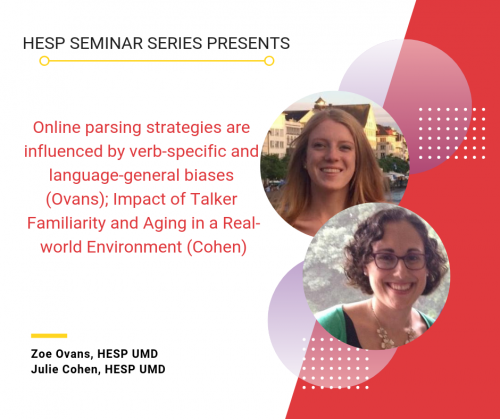The HESP Seminar next week will feature presentations by HESP PhD students Zoe Ovans and Julie Cohen.
Speaker: Zoe Ovans
Advisers: Jared Novick and Yi Ting Huang
Title: Online parsing strategies are influenced by verb-specific and language-general biases
Abstract: During comprehension, listeners parse ambiguous sentences like “Jab/Choose the elephant with the carrot” based on knowledge of verbs’ syntactic distributions. For example, “jab” often occurs in VP-attachment contexts (carrot as instrument) and “choose” often occurs in NP-attachment contexts (carrot modifies the elephant). What happens when lexical biases are uncertain (e.g. for infrequent verbs)? We tested whether listeners avoid making parsing commitments or rely on verb-general tendencies. Using a visual-world eye-tracking task, we found that for infrequent verbs, listeners relied on the verb-general VP-attachment bias in English, suggesting that listeners track language-general syntactic distributions and use this information during parsing.
Speaker: Julie Cohen
Adviser: Sandra Gordon-Salant
Title: Impact of Talker Familiarity and Aging in a Real-world Environment
Presented at American Auditory Society Meeting, March 2019
Authors: Julie Cohen, AuD; Sandra Gordon-Salant, PhD, University of Maryland, College Park, MD, College Park, MD Douglas Brungart, PhD, Walter Reed National Military Medical Center, Bethesda, MD
Abstract: Previous studies have shown that speech intelligibility performance improves when the talker's voice is familiar to the listener due to prior auditory training or previous exposure to that talker in their daily lives (as would be the case with a friend or spouse). One potential limitation of previous studies of voice familiarity is that they were conducted in laboratory environments, which may not capture the dynamic strategies that familiar talkers and listeners might be able to adopt to better understand one another in noisy environments. These studies also have not explored whether talker familiarity benefits might extend to tasks involving auditory working memory. This study evaluates talker familiarity benefit younger and older adult couples during a dynamic speech understanding task, conducted with talkers and listeners seated at a table at a local restaurant. The stimuli were novel hybrid sentences composed of a call sign and two CVC words. After four consecutive trials, all listeners were prompted to report the call signs from the previous trials. Preliminary data suggest that both older and younger adults have a familiarity benefit on the speech intelligibility test, but that performance on the working memory task was not modulated by familiarity.
Refreshments will be provided. We encourage you to continue to support our presenters by submitting your feedback via Socrative student login HOOVER6520.



